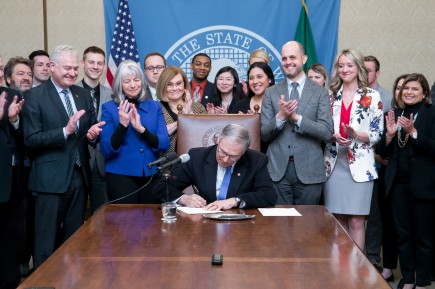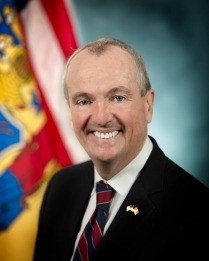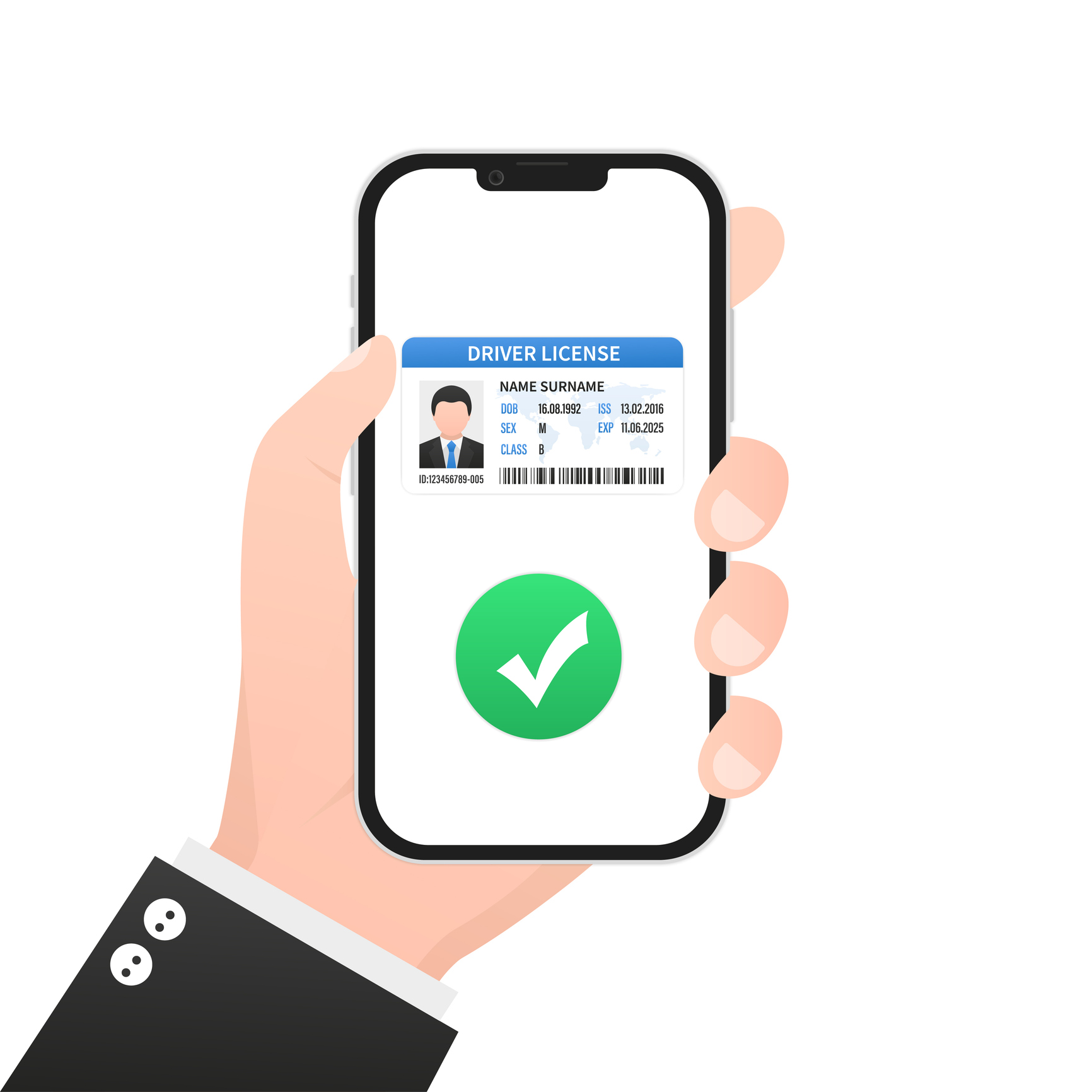 In early March, Washington Governor Jay Inslee (D) signed state legislation protecting net neutrality, while preventing internet service providers from manipulating their connection speeds for profit.
In early March, Washington Governor Jay Inslee (D) signed state legislation protecting net neutrality, while preventing internet service providers from manipulating their connection speeds for profit.
“We’ve seen the power of an open internet. It allows a student in Washington to connect with researchers all around the world — or a small business to compete in the global marketplace. It’s allowed the free flow of information and ideas in one of the greatest demonstrations of free speech in our history,” Inslee said during a signing ceremony.
The governor’s signature comes in the wake of the FCC’s decision to rescind net neutrality, which prevented ISP’s from blocking websites or charging higher-quality service for certain content. Ajit Pai, the FCC chairman, has said repealing net neutrality—which was implemented in 2015—will help broadband companies like Verizon and Comcast deliver better service. Furthermore, the FCC’s ruling comes after a host of internet companies, including Facebook, Amazon, Netflix and others lobbied to keep federal net neutrality measures.
In Congress, Senate Democrats said they only need one vote to pass federal legislation that preserves net neutrality (Maine Senator Susan Collins (R) has expressed a willingness to work with Democrats). Even with support from a handful or Republicans, any bill regulating net neutrality will likely die in the House. If GOP House members do push it through, the bill would need enough support to overcome a likely veto from the President. Meanwhile, Tennessee Rep. Marsha Blackburn (R) introduced the Open Internet Preservation Act to the House in late December, while Louisiana Sen. Bill Cassidy (R) introduced companion legislation in the Senate. Blackburn and Cassidy’s bill does not restore net neutrality, but it does prohibit carriers from “blocking” or “throttling” content. It does not, however, reclassify ISP’s as common carriers or subject them to regulatory oversight, similar to a utility. Critics say Cassidy and Blackburn’s bill would still allow providers to create internet “slow lanes” for competing services that don’t pay for faster speeds. While Cassidy’s bill has attracted no cosponsors, Blackburn’s bill has garnered 39, all Republican.
In lieu of the FCC’s decision, 27 states have introduced legislation to ensure providers adhere to certain tenants of net neutrality. In Hawaii, New York, New Jersey, Vermont and Montana, governors have signed executive orders to protect net neutrality, while 21 attorneys general have filed a protective petition for review against the FCC.
Here are what some other state and local entities are doing in response
State and Local Executive Orders

In early February, New Jersey Governor Phil Murphy (D) signed an executive order mandating net neutrality rules for any ISP’s contracted with state agencies. By imposing procurement obligations on broadband internet providers, Murphy’s order may sidestep the FCC’s regulatory oversight. Similarly, Montana Governor Steve Bullock (D), New York Governor Andrew Cuomo (D), Hawaii Governor David Ige (D), and Vermont Governor Phil Scott (R) have signed orders that implement the same measures in their respective states.
In early March at South by Southwest (SXSW) in Austin, New York City Mayor Bill de Blasio, San Francisco Mayor Mark Farrell, Portland Mayor Ted Wheeler and several other municipal leaders pledged to only contract with ISP’s that abide by net neutrality regulations. Just before the FCC ruled to eliminate net neutrality, 68 mayors and other locally-elected officials wrote Pai and expressed their dismay with the commission’s decision to preempt their ability to protect consumers. Local and state leaders are worried that ISP’s can now prioritize paid content with “fast lane access,” meaning important online government services could have slower load times compared to other online material. Furthermore, cities with large universities, or private corporations that stream a host of diverse material, may find it cumbersome to operate without net neutrality regulations.
Contracting with internet providers that adhere to fair internet practices could take a sizeable chunk of business away from large carriers. However, it won’t impact residential internet service.
State Legislation
Washington’s net neutrality regulation remains one of the few instances where Republican and Democratic lawmakers worked in cooperation to pass legislation. However, most states that have passed net neutrality regulation have liberal leanings. Inslee’s signature made Washington the first state to implement net neutrality legislation. Subsequently, a host of others have begun to follow their footsteps. In Oregon, the State Assembly passed legislation in March giving the state’s public utility commission broad authority to contract with ISP’s that offer “significant public benefits” that do not infringe upon the “open nature” of the internet. While not as harsh as Washington’s law, Oregon’s legislation also includes local government, but does exempt regions with only one provider. The bill currently awaits Governor Kate Brown’s signature (D).
In Maryland, the State House introduced an internet privacy bill that would prohibit the state from doing business with companies that do not adhere to net neutrality terms. Similarly, Pennsylvania Rep. Tim Briggs (D) has presented legislation that would prevent ISP’s from blocking or slowing online content. The bill, which is co-sponsored by Rep. Maria Donatucci (D), also has a procurement clause requiring Pennsylvania to only contract with ISPs that abide by net neutrality.
In California, there are three bills in deliberation in the legislature. If all receive Governor Jerry Brown’s (D) signature, California will have the most comprehensive net neutrality regulations in the country. State Senate Leader Kevin de Leon (also a Democratic U.S. Senate candidate) has introduced a bill that would make net neutrality a state law. De Leon’s bill would also require state entities to contract with an ISP that provides fair internet access. A second bill would go further than the FCC’s original net neutrality measure by making it illegal to exempt certain content for data limits, a concept known as “zero rating.” A third bill would provide more internet options for less-populated communities by creating network-neutral community broadband projects. Ultimately, the bill would provide consumers in areas with one ISP another option that adheres to net neutrality principles.
Not all state legislatures have paved the way for net neutrality regulations, however. In Connecticut, Republican state senators blocked a bill that would give the state great authority to regulate the internet. Through a procedural maneuver, Connecticut’s Senate leadership prevented a net neutrality measure from hitting the floor. While state Democrats called foul (the Connecticut State Senate is evenly divided among Democrats and Republicans) GOP leaders said the federal government should regulate the internet, not the state legislature. Meanwhile, net neutrality measures in West Virginia, Georgia, Idaho and New Mexico have also failed.
The FCC claims their regulations preempt any state measures because interstate broadband services falls within the federal government’s regulatory purview. Needless to say, a looming showdown between federal and state authority is likely. If the courts rule in favor of the states, it will become a nightmare for ISPs operating in different region. As a result, companies like AT&T have pushed for an “Internet Bill of Rights” to ensure a long-term regulatory framework. The prospect of having to comply with dozens of state-level net neutrality rules is a nightmare for internet providers. The FCC has said it will take states to court if they seek to circumvent its decision, but state lawmakers have not demonstrated any willingness to back down.
By Danny Restivo
Latest News
Photo credit: iStock.com/StudioGraphic As technology continues to evolve, digital driver's licenses (also known as mobile IDs) are gaining traction across the United States. States are increasingly exploring legislative measures to modernize driver identification systems, enabling [...]
NetChoice and AI regulation In this episode of the Back in Session podcast, hosts Ryan Stevens and Ryan DeMara sit down with Amy Bos, Director of State and Federal Affairs at NetChoice, to discuss the [...]
Photo credit: iStock.com/yacobchuk The use of cell phones by students in classrooms is on the rise, despite 77% of schools prohibiting cell phones at school for non-academic use. With students often disregarding these rules or [...]
In the latest episode of the "Back in Session" podcast, hosts Ryan Stevens and Ryan DeMara delve into the innovative world of AI technology applied in gun detection with Burgess Nichols from ZeroEyes. Starting with [...]





Stay In Touch